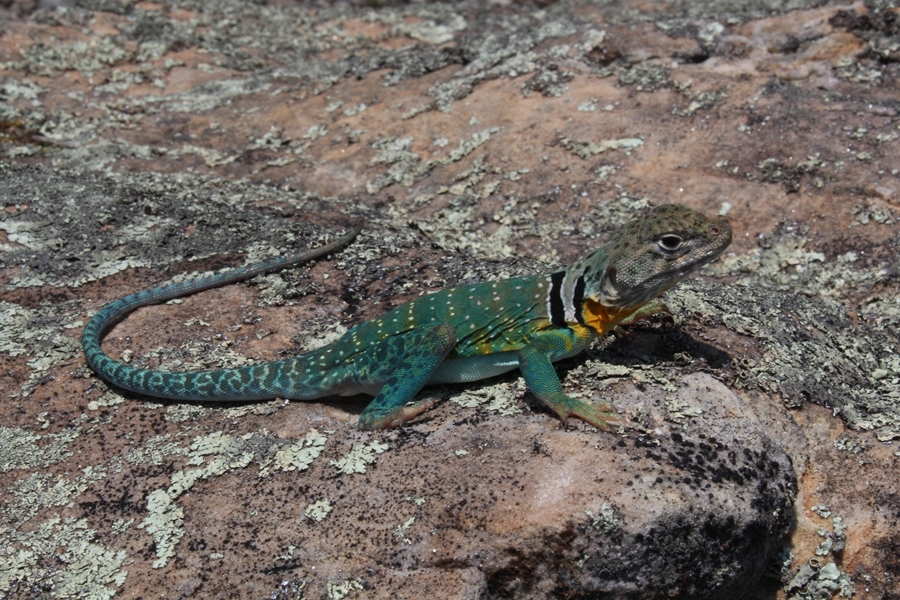FAYETTEVILLE, Ark. – Eastern collared lizards, once plentiful in the Ozark Mountains, are now listed as a “species of greatest conservation need.” What does their decline say about habitat degradation in the Ozarks?
That’s the question University of Arkansas researcher Casey Brewster worked to answer in a recent paper published in the Journal of Herpetology. Brewster, a doctoral candidate in biology, worked with Steven Beaupre, associate dean of social sciences, and J.D. Willson, associate professor of biology, to link decades of fire suppression to changes in Ozark habitat detrimental to the lizards.
“We know glade habitats have declined substantially over the last 100 years from fire suppression,” Brewster said. “We also know the collared lizard population is declining in Arkansas. Common sense tells you they are related, but if you really want to know how, you have to work out the mechanisms.”
Glade habitat, increasingly rare in the Ozarks, is open and sunny, characterized by grasses, herbaceous plants and wildflowers. Containing wild fires, instead of letting them burn, allows trees and other woody vegetation to encroach on the glade habitat, resulting in more shade and cooler temperatures. Lizards, being cold-blooded, need the sunlight to become active.
For his research, Brewster sampled 10 Ozark glade habitats and assessed each for tree density, canopy, exposed rocks and shade. Then he captured lizards to analyze their age, body size, growth and reproduction. He found slower growth and reproduction rates in lizards from areas with greater tree density, canopy and shade and fewer exposed rocks.
“More shade equals lower temperatures and less surface activity for the lizards,” Brewster said. “They spend less time at a body temperature at which they can digest food.”
The findings link environmental changes to the animals that depend on the areas, and have implications for how glade habitats should be managed for conservation.
About the J. William Fulbright College of Arts and Sciences: Fulbright College is the largest and most academically diverse unit on campus with 19 departments and more than 30 academic programs and research centers. The college provides the core curriculum for all University of Arkansas students and is named for J. William Fulbright, former university president and longtime U.S. senator.
About the University of Arkansas: The University of Arkansas provides an internationally competitive education for undergraduate and graduate students in more than 200 academic programs. The university contributes new knowledge, economic development, basic and applied research, and creative activity while also providing service to academic and professional disciplines. The Carnegie Foundation classifies the University of Arkansas among only 2 percent of universities in America that have the highest level of research activity. U.S. News & World Report ranks the University of Arkansas among its top American public research universities. Founded in 1871, the University of Arkansas comprises 10 colleges and schools and maintains a low student-to-faculty ratio that promotes personal attention and close mentoring.
Contacts
Casey Brewster, Graduate Assistant, Department of Biological Sciences
J. William Fulbright College of Arts and Sciences
240-377-1752,
Bob Whitby, feature writer
University Relations
479-575-4737,
